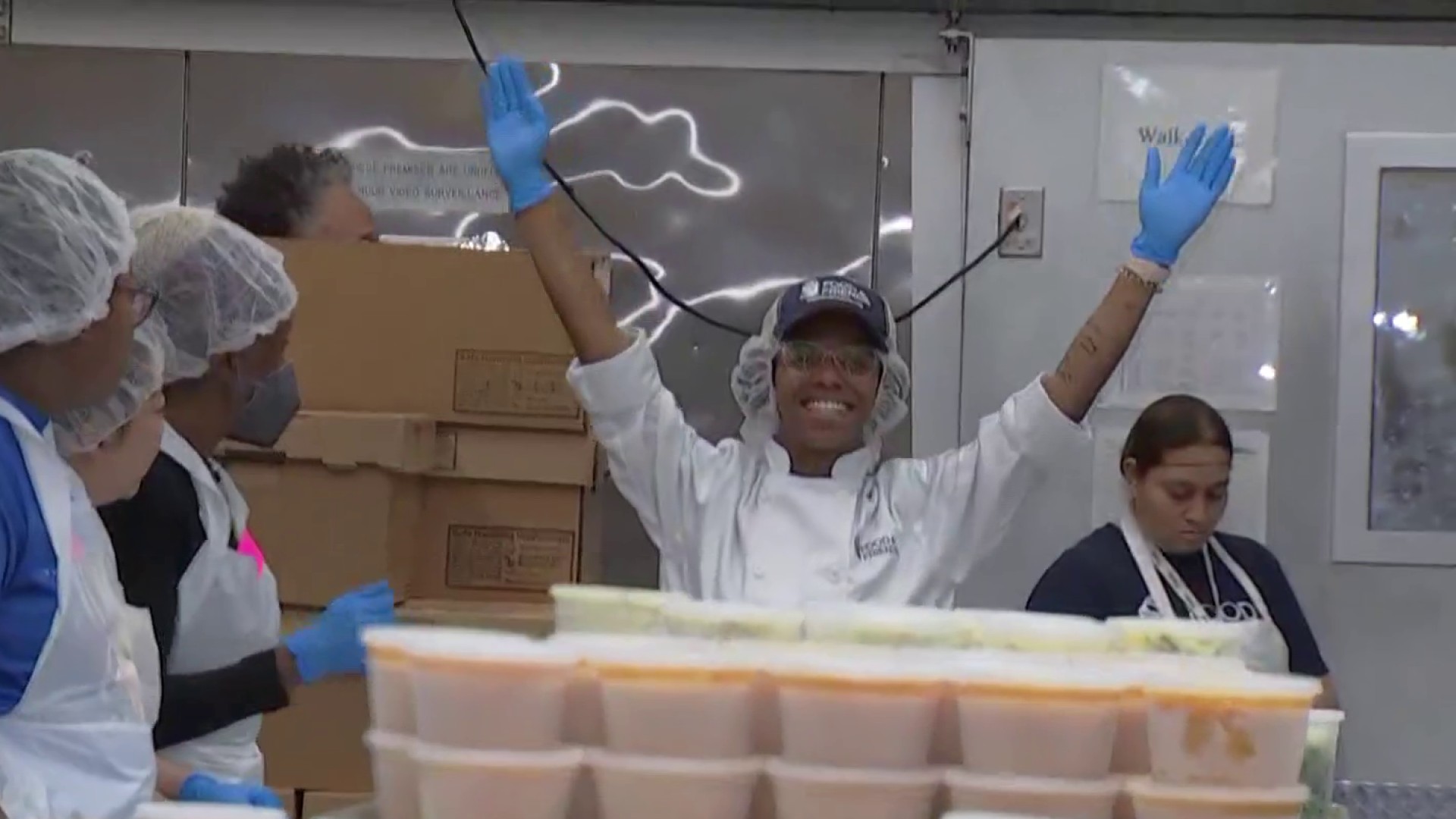A D.C. family was hoping for their loved one to be released this month after serving 12 years in prison for armed carjacking and robbery – crimes he committed as a teen in 2012. Instead, 29-year-old Robert Jeter is dead, and his family is fighting to find out what led to his passing in federal custody last fall.
“I have nothing. I don't have his death certificate. I don't have the autopsy report ... We have nothing but this corpse,” said his mother, Christina Jeter.
Last October, Jeter was found unresponsive in his cell at USP Victorville, part of a massive federal facility in California. According to his mother, a prison chaplain called her to say her son was in grave condition and had been transported to a nearby hospital.
“She said, 'Your son was found unresponsive.' I said, 'Is he dead?' She said, 'I don't know,'” Christina Jeter said.
We've got the news you need to know to start your day. Sign up for the First & 4Most morning newsletter — delivered to your inbox daily. Sign up here.
She told the prison official she was on her way to be by his side.
“That's when they told me that, by the time I got to California, he'd already be dead because he doesn’t have brain activity,” she said.
According to coroner records, Jeter officially died Oct. 27 at Arrowhead Regional Medical Center, and his body was sent to the coroner for review. But his mother said the family didn’t receive his body in D.C. for nearly six weeks and have waited more than five months for information that could shed light into his passing.
Local
Washington, D.C., Maryland and Virginia local news, events and information
Their search for answers highlights a lack of transparency and unique challenges the News4 I-Team found many D.C. families say they face after their loved one is incarcerated in the Federal Bureau of Prisons (BOP).
That’s because without a dedicated federal prison, people convicted of crimes in D.C.’s Superior Court are shipped to federal facilities across the country. Through a Freedom of Information Act request, the I-Team found more than 2,550 of D.C.’s convicted residents are currently serving time in federal prisons across the U.S.
And though a BOP policy requires the bureau to try to place inmates within 500 miles of their home, last year Jeter was transferred to Victorville – nearly 2,600 miles away from the District.
“He should have never been there,” his mother said.
In an email, a Victorville prison official declined a request for an interview and directed the I-Team to file open records requests with the BOP for information about Jeter’s death. The I-Team has submitted multiple questions and records requests to the bureau headquarters and its western division and has not yet received the information.
Early challenges
Before Jeter was federal inmate 50080-007, his sister Tyria says he was her lovable little brother.
“He was a happy kid,” she said. “He was just very loving and he would make you laugh at any moment, even if you were having a bad day.”
But that changed as he got older and struggled with learning disabilities. Barely able to read and write, his family said he was bullied and eventually dropped out of high school.
“Robert just started getting into things that he shouldn't have been getting into; following people, doing things that was out of the ordinary,” Christina Jeter recalled.
In June 2012, Jeter and a friend were arrested for carjacking and armed robbery.
“Robert couldn't even comprehend the danger he had put himself into,” his mother said.
He was sentenced to 12 years and, according to his family, began his incarceration at FCI Gilmer in Glenville, West Virginia. His family often visited him there, but after serving more than half his sentence at Gilmer, his mother said he was moved farther and farther from D.C. until he arrived in California last year.
His mother said she doesn’t know why he was transferred there as his hopeful release date approached. The BOP declined to specifically address Jeter’s case to the I-Team, but a spokesman said while the BOP attempts to place inmates within the 500-mile radius, the inmate may be placed elsewhere due to "specific security, programming, or population concerns."
Medical assessments in court records reviewed by the I-Team showed he was in good health while incarcerated in West Virginia. His mother said she doesn't know what could have changed by the time he arrived at USP Victorville, where prison officials told her his health “had been failing” around the time he was taken to the hospital.
She said she had even more questions after speaking to a doctor at the hospital, who -- according to Christina Jeter -- told her that her son appeared to have “trauma to the brain so severe that his brain had swollen and hemorrhaged” and that he was “beaten so severely that his liver was, you know, split.”
Christina Jeter said no one at the jail or BOP has confirmed those injuries to her. She hoped his autopsy would give them some insight into his death. Instead, earlier this year, the San Bernardino County Sheriff's Department coroner ruled Jeter's death "undetermined."
The I-Team requested all available records from the coroner's office but has been told it could take six to 12 months following his death to receive them.
Seeking answers
“I have heard of autopsies and investigations being blocked and results taking a long time, but this is at the extreme end of what I've heard,” said Deborah Golden, a local civil rights attorney who has represented many D.C. inmates and their families.
She said it's not only difficult to get timely answers from BOP about in-custody deaths but even more difficult to get justice if wrongdoing is potentially found.
The longer it takes, she said, the more families lose “any sense of accountability. Any sense of justice. In many cases, the ability to pursue legal action because statutes of limitations have run. And the human sense of finding out what happened to your loved one is lost.”
Former D.C. Chief Medical Examiner Dr. Roger Mitchell, author of "Death in Custody: How America Ignores the Truth and What We Can Do About It," said he encourages families to pursue a second autopsy when a loved one dies in custody.
“A second forensic autopsy on an individual that died in custody is extremely important. It's like getting a second opinion when you’ve been given a diagnosis of cancer,” he said.
But Mitchell said it’s best to do so in a timely manner, noting that critical information would have been lost in the several weeks it took for the Jeter family to receive his body. The Jeter family, meanwhile, opted against a private autopsy, as they were told it would cost several thousand dollars.
Mitchell said Jeter's story underscores why he added a checkbox to the D.C. death certificate to help track in-custody deaths. It's something he wants to see on all U.S. death certificates to help track the frequency and cause of deaths behind bars.
“We have a very accurate account of how many people are dying from fentanyl and opioids, and we should, because that's a public health approach that informs policy well beyond the public health policy,” Mitchell said. “What I'm saying, and what the National Medical Association is saying, is that we need that same approach to death in custody.”
Del. Eleanor Holmes Norton, who represents the District in the U.S. House, introduced multiple pieces of legislation she said are aimed at improving life behind bars for D.C.’s incarcerated. One bill would keep D.C. inmates serving federal time within 250 miles of the District.
“One of the most important things you could do for an inmate is to make him as close to his loved ones as possible,” Norton told the I-Team. “Putting him miles away will make reentry difficult and will make it difficult for him while in prison.”
Her other measure would require the BOP to provide routine updates to the D.C. mayor on where local inmates are housed and their expected release date.
Norton’s questions surrounding the deaths of two D.C. inmates at USP Hazelton in 2018 prompted the Office of the Inspector General for the Department of Justice to study death-in-custody procedures at the BOP.
In February, the OIG released a report into the deaths of 344 BOP inmates who died between 2014 and 2021.The OIG found the BOP's response to medical emergencies often insufficient and that a lack of available information about inmate deaths limits the BOP's ability to potentially prevent future deaths.
In a hearing before Congress about the OIG’s findings, BOP Director Colette Peters said the bureau is making improvements but that short staffing and a lack of funding for competitive compensation are part of the problem.
That’s little comfort to the Jeter family, which buried Robert Jeter just before the new year.
“He had hopes. He wanted to live his life,” Christina Jeter said.
She said she has accepted that she won't see her son again, but she can't rest until she knows how his prison sentence became a death sentence.
This story was reported by Tracee Wilkins, produced by Katie Leslie, shot by Steve Jones and Jeff Piper, and edited by Jeff Piper. News4 photographer Evan Carr contributed to this report.



